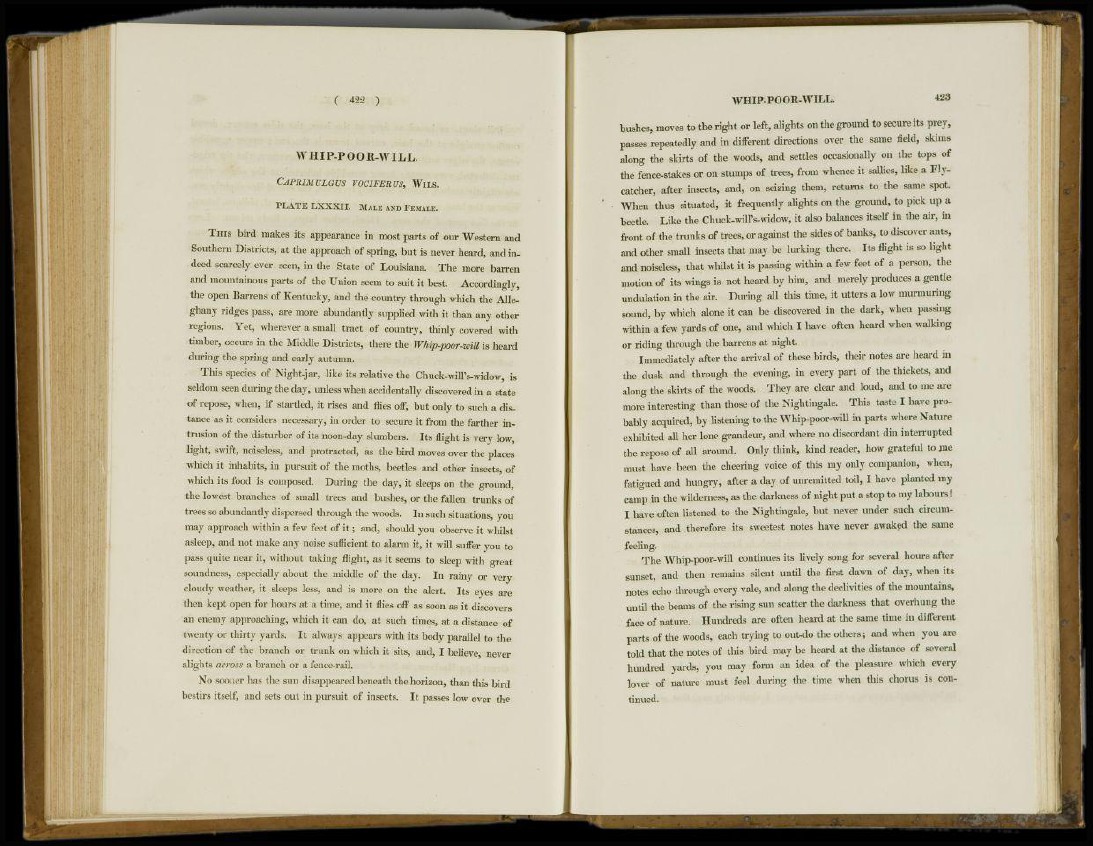
( 422 )
WHIP-POOR-WILL.
CJPRIMULGUS VOCIFERUS, WILS.
P L A T E L X X X I I . MALE AND FEMALE.
T H I S bird makes its appearance in most parts of our Western and
Southern Districts, at the approach of spring, but is never heard, and indeed
scarcely ever seen, in the State of Louisiana. The more barren
and mountainous parts of the Union seem to suit it best. Accordingly,
the open Barrens of Kentucky, and the country through which the Alleghany
ridges pass, are more abundantly supplied with it than any other
regions. Yet, wherever a small tract of country, thinly covered with
timber, occurs in the Middle Districts, there the Whip-poor-will is heard
during the spring and early autumn.
This species of Night-jar, like its relative the Chuck-wiLTs-widow, is
seldom seen during the day, unless when accidentally discovered in a state
of repose, when, if startled, it rises and flies off, but only to such a distance
as it considers necessary, in order to secure it from the farther intrusion
of the disturber of its noon-day slumbers. Its flight is very low,
light, swift, noiseless, and protracted, as the bird moves over the places
which it inhabits, in pursuit of the moths, beetles and other insects, of
which its food is composed. During the day, it sleeps on the ground,
the lowest branches of small trees and bushes, or the fallen trunks of
trees so abundantly dispersed through the woods. In such situations, you
may approach within a few feet of i t ; and, should you observe it whilst
asleep, and not make any noise sufficient to alarm it, it will suffer you to
pass quite near it, without taking flight, as it seems to sleep with great
soundness, especially about the middle of the day. In rainy or very
cloudy weather, it sleeps less, and is more on the alert. Its eyes are
then kept open for hours at a time, and it flies off as soon as it discovers
an enemy approaching, which it can do, at such times, at a distance of
twenty or thirty yards. It always appears with its body parallel to the
direction of the branch or trunk on which it sits, and, I believe, never
alights across a branch or a fence-rail.
No sooner has the sun disappeared beneath the horizon, than this bird
bestirs itself, and sets out in pursuit of insects. It passes low over the
WHIP-POOR-WILL. 423
bushes, moves to the right or left, alights on the ground to secure its prey,
passes repeatedly and in different directions over the same field, skims
along the skirts of the woods, and settles occasionally on the tops of
the fence-stakes or on stumps of trees, from whence it sallies, like a Flycatcher,
after insects, and, on seizing them, returns to the same spot.
When thus situated, it frequently alights on the ground, to pick up a
beetle. Like the Chuck-will's-widow, it also balances itself in the air, in
front of the trunks of trees, or against the sides of banks, to discover ants,
and other small insects that may be lurking there. Its flight is so light
and noiseless, that whilst it is passing within a few feet of a person, the
motion of its wings is not heard by him, and merely produces a gentle
undulation in the air. During all this time, it utters a low murmuring
sound, by which alone it can be discovered in the dark, when passing
within a few yards of one, and which I have often heard when walking
or riding through the barrens at night.
Immediately after the arrival of these birds, their notes are heard in
the dusk and through the evening, in every part of the thickets, and
along the skirts of the woods. They are clear and loud, and to me are
more interesting than those of the Nightingale. This taste I have probably
acquired, by listening to the Whip-poor-will in parts where Nature
exhibited all her lone grandeur, and where no discordant din interrupted
the repose of all around. Only think, kind reader, how grateful to me
must have been the cheering voice of this my only companion, when,
fatigued and hungry, after a day of unremitted toil, I have planted my
camp in the wilderness, as the darkness of night put a stop to my labours!
I have often listened to the Nightingale, but never under such circumstances,
and therefore its sweetest notes have never awaked the same
feeling.
The Whip-poor-will continues its lively song for several hours after
sunset, and then remains silent until the first dawn of day, when its
notes echo through every vale, and along the declivities of the mountains,
until the beams of the rising sun scatter the darkness that overhung the
face of nature. Hundreds are often heard at the same time in different
parts of the woods, each trying to out-do the others; and when you are
told that the notes of this bird may be heard at the distance of several
hundred yards, you may form an idea of the pleasure which every
lover of nature must feel during the time when this chorus is continued.